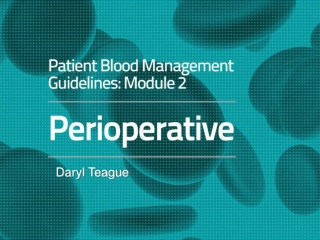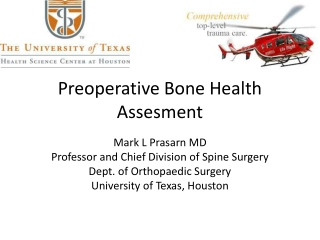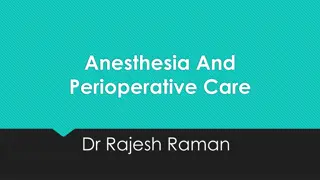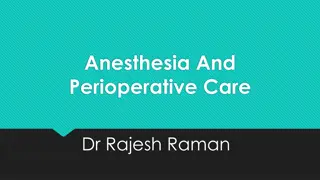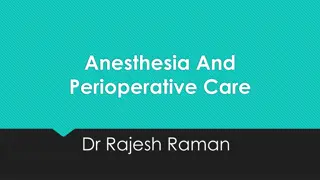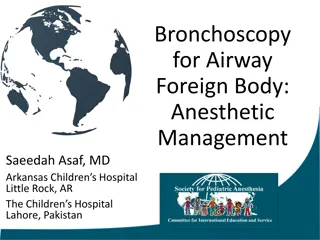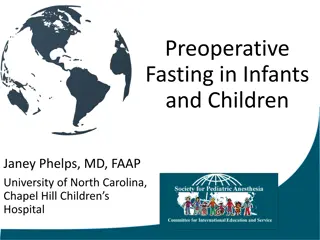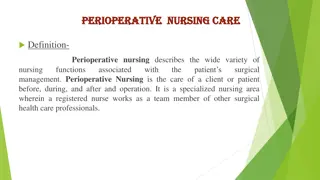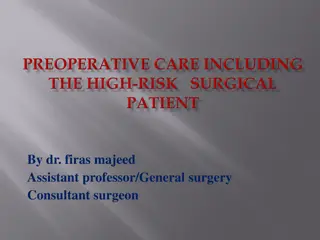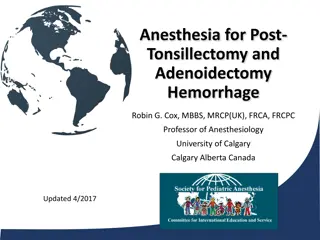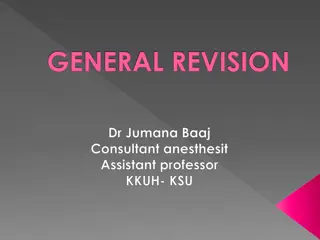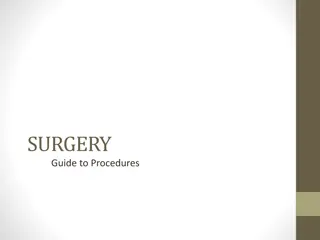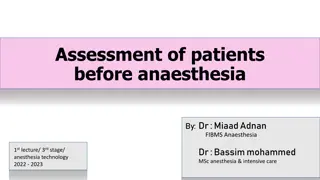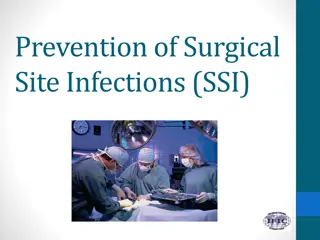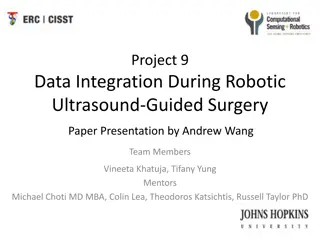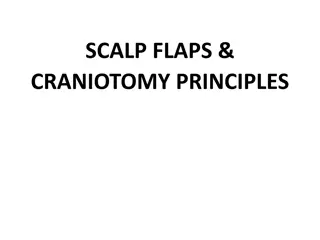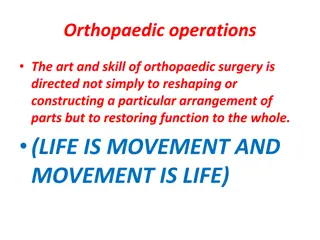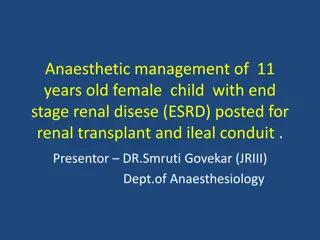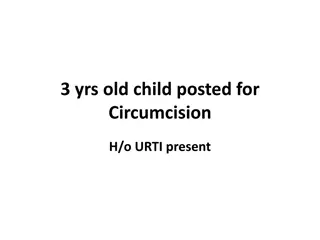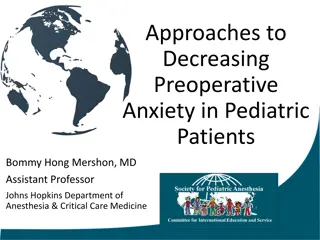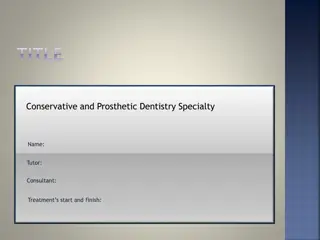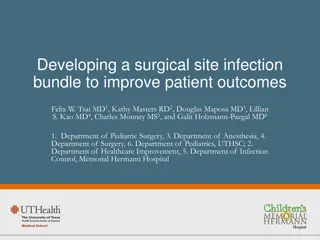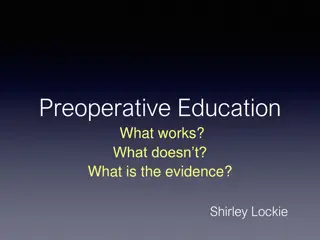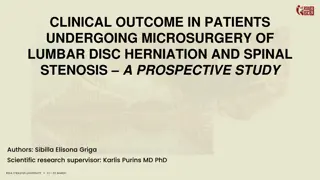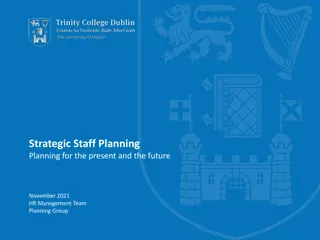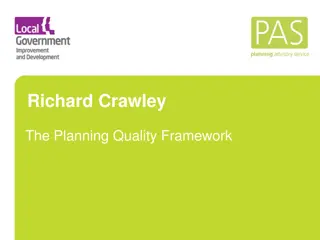Perioperative Patient Blood Management
The Patient Blood Management (PBM) Program implemented by Orthopaedic Surgeon Daryl Teague to provide optimal care for Ruby, a 73-year-old with diabetes and high blood pressure, who needs a new hip joint. The program includes preoperative anemia assessment, intraoperative blood conservation, and pos
2 views • 20 slides
Preoperative Bone Health Assessment in Spine Fusion Surgery
This presentation by Dr. Mark L. Prasarn focuses on the importance of assessing preoperative bone health in older patients undergoing spine fusion surgery. It covers the potential bone-related complications, osteogenesis process, osteoconduction, osteoinduction, and the favorable biomechanical envir
1 views • 67 slides
Anesthesia and Perioperative Care - Comprehensive Guide by Dr. Rajesh Raman
This detailed guide by Dr. Rajesh Raman covers various aspects of anesthesia and perioperative care, including preoperative assessment and optimization, intraoperative care, postoperative care, perioperative risk assessment, risk due to surgery, medication management, and routine investigations for
2 views • 31 slides
Anesthesia And Perioperative Care
This detailed guide covers key aspects of anesthesia and perioperative care, emphasizing preoperative assessment, optimization, intraoperative management, and postoperative care. Topics include perioperative risk assessment, risk scoring, routine investigations, and medication management strategies
1 views • 31 slides
Anesthesia and Perioperative Care by Dr. Rajesh Raman
This informative content covers various aspects of anesthesia and perioperative care including preoperative assessment, optimization, intraoperative and postoperative care, perioperative risk assessment, risk due to surgery, risk scores for major cardiac events, routine investigations for patients,
0 views • 31 slides
Anesthetic Management of Bronchoscopy for Airway Foreign Body
This article discusses the anesthetic management of bronchoscopy for airway foreign body, including presentation, preoperative work-up, intraoperative management, and postoperative care. It highlights the incidence of foreign body inhalation, immediate and delayed presentations, findings on chest X-
2 views • 32 slides
Preoperative Fasting in Infants and Children: Guidelines and History
Explore the evolution and rationale behind preoperative fasting guidelines in infants and children, including historical cases of aspiration during anesthesia. Learn about Mendelson Syndrome, recommendations for aspiration prevention, and the development of NPO orders over the years. Discover the im
0 views • 26 slides
Essential Aspects of Perioperative Nursing Care
Perioperative nursing involves comprehensive care for patients before, during, and after surgery. It encompasses various phases such as preoperative, intraoperative, and postoperative care, with a focus on ensuring the patient's well-being and safety throughout the surgical process. Key goals includ
0 views • 33 slides
Preoperative Planning for Surgery: Optimizing Patient Outcomes
Major surgery can induce physiological changes, increasing oxygen demand and leading to postoperative risks. Careful preoperative planning is crucial to minimize adverse effects. This involves thorough history-taking, examination, and investigations to assess patient readiness and optimize their con
0 views • 35 slides
Integrated Energy Planning Workshop Overview
This content provides insights into an Energy Balance and Planning Models workshop conducted by Gabriel Hernandez, focusing on the planning process, energy planning principles, and integrated energy planning. It covers topics such as defining objectives, collecting information, scenario visualizatio
0 views • 7 slides
Autologous Blood Donation: Advantages, Types, and Considerations
Autologous blood donation involves collecting and storing a patient's own blood for later transfusion, offering numerous advantages such as reducing the risk of transfusion-transmitted diseases and providing compatible blood for patients with allo-antibodies. However, it also comes with concerns lik
1 views • 46 slides
Parathyroid Carcinoma Misdiagnosed as Thyroid Lesion: A Case Study
Parathyroid carcinoma (PC) is a rare malignancy often challenging to differentiate from benign thyroid nodules. This case study highlights a 50-year-old male patient whose nonfunctioning sporadic PC was initially misidentified as a follicular thyroid nodule. Despite preoperative evaluations, includi
4 views • 27 slides
Anesthesia Management for Post-Tonsillectomy Hemorrhage in Children
This article discusses the epidemiology, causes, and anesthesia management of post-tonsillectomy and adenoidectomy hemorrhage in children. It covers the rates of hemorrhage following these procedures, including primary and secondary occurrences, mortality statistics, and specific factors contributin
0 views • 31 slides
Strategic Planning for Sustainable Development: A Comprehensive Overview
Planning and strategic planning play crucial roles in achieving sustainable development goals. This presentation delves into the concepts of planning, strategic planning, sustainable development, the SDGs, types of planning, steps in the strategic planning process, and the importance and challenges
0 views • 20 slides
Anesthesiology Lecture Series: Comprehensive Overview by Dr. Jumana Baaj
Delve into the realm of anesthesiology with Dr. Jumana Baaj's comprehensive lecture series covering the role of an anesthetist in preoperative care, NCEPOD classifications, perioperative patient journey, general anesthesia techniques, and airway management. Learn about patient assessment, anesthetic
0 views • 35 slides
Perioperative Fluid Therapy: Key Concepts and Considerations
Understanding perioperative fluid therapy is crucial for maintaining normovolemia, achieving hemodynamic stability, and preventing complications. Factors such as total body water variation, fluid resuscitation goals, desirable outcomes, and fluid and electrolyte regulation play a critical role in en
3 views • 56 slides
Comprehensive Guide to Surgical Procedures Preparation
This detailed guide provides step-by-step instructions on patient preparation for surgical procedures, including patient prep, setting up sterile fields, and prepping the operative site. It covers essential aspects such as emplacing a tourniquet, washing the wound, performing preoperative irrigation
1 views • 40 slides
The Role of ESR and CRP in Preoperative Workup for Total Knee Arthroplasty
Preoperative assessment for primary total knee arthroplasty should consider including ESR and CRP levels as routine tests due to their accuracy in diagnosing periprosthetic joint infection (PJI). Elevated postoperative ESR/CRP levels can serve as predictors of PJI, aiding in prompt diagnosis and tre
1 views • 26 slides
Preoperative Assessment of Patients for Anesthesia: Guidelines and Protocols
Efficient preoperative assessment is crucial to ensure patient safety and optimal outcomes during anesthesia administration. This process involves thorough history taking, physical examination, evaluation of medical conditions, and planning for anesthesia techniques. The assessment helps in identify
0 views • 46 slides
Prevention of Surgical Site Infections: Key Factors and Recommendations
Surgical site infections (SSIs) are a significant concern in healthcare settings, with 25% of healthcare-associated infections being SSIs. They are preventable, but still pose challenges due to multifactorial causes. Risk factors include uncontrolled diabetes, obesity, smoking, and length of preoper
2 views • 28 slides
Robotic Ultrasound Integration for Surgeon Autonomy in Surgery
This paper presentation by Andrew Wang's team focuses on the data integration during robotic ultrasound-guided surgery. The project proposes the integration of live ultrasound feed and an image browser to view saved ultrasound images, along with the ability to construct 3D models of organs using pre
0 views • 22 slides
Understanding Pediatric Social and Emotional Milestones in Anesthesia
Tailoring preoperative assessment and anesthetic management to a child's developmental level is crucial. Children's responses to stress vary based on their cognitive potential and developmental stage. Incorporating behavioral techniques informed by developmental theories like Piaget's and Erickson's
0 views • 24 slides
Surgical Techniques for Scalp Flaps and Craniotomy Principles
Explore the historical perspective, anatomical considerations, land marks, blood supply, and principles of scalp flaps and craniotomy procedures. Learn about the 5 layers of the scalp, neurovascular structures, blood vessels involved, and crucial steps in preoperative planning and execution of crani
0 views • 41 slides
The Art of Orthopaedic Surgery: A Comprehensive Guide
Orthopaedic surgery involves intricate planning, precise execution, and specialized equipment to restore function to the body. From preoperative assessments to intraoperative techniques like radiography and magnification, this field aims to enhance mobility and quality of life. The use of tourniquet
0 views • 22 slides
Anaesthetic Management of 11-Year-Old Female with End-Stage Renal Disease (ESRD) for Renal Transplant and Ileal Conduit
An 11-year-old female child with end-stage renal disease (ESRD) and multiple surgical histories was evaluated for renal transplant and ileal conduit surgery. The patient presented with hypertension, chronic kidney disease, neurogenic bladder, and urinary incontinence. Preoperative assessments reveal
0 views • 22 slides
Preoperative Considerations for Circumcision in a 3-Year-Old Child with URTI
Preoperative assessment and management play a crucial role in optimizing outcomes for young children undergoing elective circumcision, especially when the child has a history of upper respiratory tract infection (URTI). Factors such as URTI severity, parental smoking, airway anomalies, and history o
0 views • 17 slides
Pediatric Strategies to Reduce Preoperative Anxiety Impact
Pediatric preoperative anxiety can lead to negative behavioral changes post-hospitalization and adverse outcomes during anesthesia. Identifying risk factors and implementing non-pharmacologic and pharmacologic interventions can help alleviate anxiety and improve overall surgical experience for child
0 views • 36 slides
Study on Active Smoking and 30-Day Wound Events post Minimally Invasive Inguinal Hernia Repair
This study by Ivy N. Haskins, MD, analyzes the association between active smoking and 30-day wound events following minimally invasive inguinal hernia repair. It explores the necessity and feasibility of preoperative smoking cessation, involving a detailed analysis of 2,652 inguinal hernia repairs,
0 views • 13 slides
Comprehensive Approach to Conservative and Prosthetic Dentistry
This detailed presentation covers the essential aspects of conservative and prosthetic dentistry, highlighting the importance of thorough dental investigations, patient medical and dental history, intraoral examinations, X-rays, preoperative treatments, and treatment planning. The content emphasizes
0 views • 20 slides
Developing a Surgical Site Infection Bundle for Improved Patient Outcomes
Developing a comprehensive Surgical Site Infection (SSI) bundle to reduce infection rates, including interventions like preoperative chlorhexidine baths, standardized antibiotic protocols, and targeted prophylactic measures. By implementing these strategies, the aim is to lower infection rates below
0 views • 24 slides
Evidence-Based Insights on Preoperative Patient Education in Surgical Nursing
Preoperative patient education plays a crucial role in surgical nursing, aiming to reduce anxiety, empower patients, and enhance recovery outcomes. Limited systematic evidence exists on its specific impact, influenced by patient engagement, knowledge levels, nurse expertise, and empowerment factors.
0 views • 37 slides
Anesthetic Considerations for Pediatric Patients with Osteogenesis Imperfecta
This presentation discusses the pathophysiology, clinical features, diagnosis, and common surgeries for pediatric patients with Osteogenesis Imperfecta (OI), a genetic disorder affecting bone integrity. It emphasizes the importance of preoperative considerations, formulating appropriate anesthetic p
0 views • 20 slides
Clinical Outcomes in Microsurgery for Lumbar Disc Herniation: Prospective Study
This prospective study examined the clinical outcomes in patients undergoing microsurgery for lumbar disc herniation and spinal stenosis. The study evaluated the effectiveness of surgical intervention using the Oswestry Disability Index (ODI) and Numeric Rating Scale (NRS) questionnaires preoperativ
0 views • 13 slides
Importance and Benefits of Nutrition in Respiratory Diseases
Nutrition plays a crucial role in respiratory diseases such as COPD and CF, with malnutrition affecting a significant percentage of patients. Poor nutritional status is linked to increased morbidity and mortality in these patients, impacting pulmonary health and muscle function. MediDrink Pulmo offe
0 views • 7 slides
Preoperative Assessment and Management for Squint Surgery in a 4-Year-Old Male Patient
Assessing a 4-year-old male patient booked for right eye squint surgery involves evaluating his preoperative risks, conducting necessary tests, assessing medication needs, and ensuring fasting protocols are followed. Key aspects include reviewing medical history, conducting physical examinations, ad
0 views • 14 slides
Understanding the Planning Advisory Service: Key Facts and Recommendations
The Planning Advisory Service (PAS) is a vital resource for local planning authorities, funded by DCLG and established in 2004. This service aims to enhance planning services, drive improvements, and navigate changes within the planning system. PAS supports, promotes, and innovates planning practice
0 views • 28 slides
Strategic Staff Planning for Future Success
Strategic Staff Planning involves aligning workforce to future goals through short and long-term approaches. It includes 3 Horizons, Operational Workforce Planning, and Strategic Workforce Planning to ensure capabilities match organizational strategies. The process spans from tactical short-term pla
1 views • 9 slides
Challenges in Government Planning: The Importance of Quality Frameworks
Research by Richard Crawley highlights concerns regarding government planning performance targets leading to perverse behavior and the need for a focus on good practices in local planning authorities. The Planning Advisory Service (PAS) since 2009 has been facilitating benchmarking to improve planni
0 views • 8 slides
Impact of Preoperative Fasting on Oral Medication Administration
Investigating the impact of preoperative fasting on the continuity of regular oral medication administration reveals concerns with excessive fasting, including insulin resistance, dehydration, and confusion. The study highlights how misleading fasting instructions can lead to the discontinuation of
0 views • 29 slides
Anesthesia Preparation and Airway Assessment for Knee Arthroscopy Patient
An overview of preparing a diabetic patient for knee arthroscopy surgery, including considerations for anesthesia, diabetes management, and airway assessment. The patient in this case study has a torn meniscus and is categorized as ASA Class 2. Steps to ensure optimal diabetes control, preoperative
0 views • 19 slides
